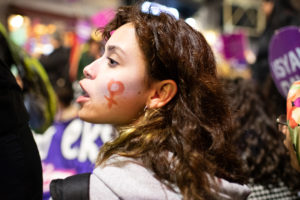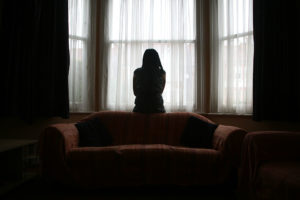Georgia Gabriel-Hooper was just 14 when she saw her mother, Cheryl, being shot dead through the window of her car by her stepfather. This was the culmination of seven years of abuse, threats and control.
Cheryl had always been “the life and soul of the party” before Andrew came along and won her over with his charm and intelligence. But almost as soon as the relationship began, Cheryl changed. “She was always very stressed and on edge,” Georgia says. “Every time they went out, she was always trying hard to put on a front. She was always having to make excuses for his behaviour. By the end, I didn’t really recognise my mum anymore.”
Georgia knew that her stepfather resented her. “I was just a piece of baggage that he had to put up with, but he gaslit and controlled me in just the same way as he did with mum,” she says. “I was boisterous, I was loud and I needed a lot of attention which he didn’t like. Mum was trying to keep me calm and keep him happy, which must have been a nightmare for her.”
Cheryl wanted to leave Hooper, says Georgia, but he had “tied up her finances”, made her “feel worthless” and left her completely dependent on him. But people knew what Hooper was like: “Locally, he was known for being aggressive and violent. He would go out and fight on nights out and get blind drunk.”
Cheryl increased her efforts to get away from Hooper after he started to turn violent. On one occasion he smashed in their television and opened his gun cabinet so that mother and daughter knew how serious he was about not letting them leave. “My mum was shaking so violently, it was horrible,” says Georgia. “She knew it was a threat that he would kill her. I was the one that pushed her to leave in the end.”
Cheryl and Georgia originally left Hooper in December 2017, although they returned for Christmas when Hooper threatened to kill himself. After they left again, Hooper started stalking Cheryl, phoning and texting constantly; he even fitted a tracker to Cheryl’s car. “He was driving around everywhere to find my mum, and told someone, ‘If I can’t have her, nobody will,’ says Georgia.
“I lived in dread for years,” says Georgia. “I knew he was capable of doing us both serious harm.”
Weeks later, Cheryl was dead and Georgia deeply traumatised.
“I had no support from specialist services after it happened,” says Georgia. “Absolutely none. As a family we had a little bit of help from Victim Support but nothing geared towards me as a child.” Yet she had lived for seven years with an abusive stepfather. Inevitably, Georgia “went down a dark path for a very long time”. She admits she turned to smoking and drinking when she was just 14. “I was incredibly lost.”
Domestic violence ruins lives: not just the women who are the victims, but also those poor children who are caught up in the crossfire.
Around 62% of children are present during domestic abuse incidents, and at least one in seven children will have lived with domestic violence by the time they reach 18. A recent report by Action for Children found that support for children affected by domestic abuse was “patchy, piecemeal and precarious”. And yet those children will carry what they have seen with them for the rest of their lives.
The effects can be devastating: girls are more likely to develop an eating disorder, or to harm themselves by taking overdoses or cutting themselves, and boys often learn the behaviour from the male abuser and begin to act out in violent and aggressive ways towards the mother.
Rachel Williams knows only too well the terrible toll it takes on children. In 2011, she was shot by her ex-husband Darren following months of stalking and harassment after she finally plucked up the courage to leave him due to extreme physical and emotional violence.
Tracking Rachel down to the hair salon where she worked, Williams fired two gunshots which hit her leg rather than her stomach as intended. Williams then turned the gun on himself.
Rachel’s son Jack, 16, who had lived with the abuse since he was two, went to stay with his paternal grandparents while his mother recovered in hospital. Rachel was surprised that Jack didn’t visit her, given how close they were, saying “he was like my shadow, wherever I was Jack was”. Instead of a visit, Rachel received angry texts from Jack blaming her for his father’s death. Then, six weeks after Rachel had been shot, Jack killed himself.
“Had Jack been given the support he needed when this happened, rather than just being told he was 16 so could live where he wanted, he would probably be alive today,” says Rachel. “Jack was very popular and outgoing. He had no problems at all with his mental health until the shooting. Jack was a victim of domestic abuse, not just a witness.”
Georgia, who went to live with her loving grandparents following her mother’s death, managed to stop abusing alcohol and turned a corner from a path of self-destruction by turning instead to campaigning to end domestic violence.
During the desperate 18-month wait for Hooper’s case to go to trial (he eventually was convicted of murder and sentenced to 31 years in prison), Georgia began researching people who’d been through similar situations and she found Rachel’s book: The Devil at Home.
Following her experiences, Rachel founded Stand Up to Domestic Abuse (SUTDA), mainly for those forgotten victims of domestic abuse: the children. “I was like a GP on call in those early days,” says Rachel, “and when a message came in on my Facebook page from Georgia, my heart went out to her.”
Rachel invited the then 15-year-old Georgia to attend a conference she was hosting which focused on domestic abuse survivors. It was there that I heard Georgia speak for the first time about the terrible events leading up to her mother’s death. “Looking back now I can see the signs of how his controlling behaviour became worse,” she said. “And because she was trying to leave the relationship he decided she was not going to be allowed to do that.”
The entire audience was profoundly moved by this young woman making sense of how domestic abuse entraps women and their children, and her rally cry for better understanding and provision for those affected.
“My mum was an incredibly strong character, and not someone you would see as a ‘typical victim’ as if there even is one,” says Georgia. “She gave me that little voice in the back of my head telling me, ‘You can’t let your mum down’.” It was important to change the narrative about who becomes a victim of domestic abuse: these women aren’t necessarily weak or complicit.
Women make up the vast majority of domestic abuse victims. Those most likely to be stalked and harassed, and to sustain serious injury are those who have ended (or attempted to end) a violent relationship. Each year, more than 100,000 people in the UK are at imminent risk of being murdered or seriously injured as a result of domestic abuse, with the risk increasing for those women that leave.
In England & Wales, more than 50,000 high-risk victims and 70,000 children are considered to be at “high risk” of serious harm, including homicide, by statutory agencies.
When PC Mike Taggart was 15, his mother Donna was murdered by her violent, alcoholic husband after she told him she wanted a divorce. “She was outgoing, warm and bubbly, but 11 years married to him changed her totally,” says Taggart. “It was constant belittling and misogynistic stuff.”
“He was dominant and aggressive to my sister and to me,” says Taggart. “We would do all we could to avoid him, including staying with friends every weekend. That was when he would get steaming drunk.” But it was impossible to escape the effects of living with domestic violence. “We walked on eggshells and would be dreading his next move.”
Taggart, who joined the police at a very young age, has focused on improving police practice regarding domestic abuse, and was awarded an MBE in 2021 for services to victims. He does his work not just with his mum in mind, but all the women and children in a similar situation. And there are so many.
The effects of not dealing with those children caught up in the crossfire of domestic violence and abuse is catastrophic. Numerous studies show that children who grow up with violence are at serious risk of long-term physical and mental health problems, such as chronic anxiety, addiction, depression, and self-harming.
But, in recent years, campaigners have lobbied to change the narrative from “witness” to “victim” when it comes to such children. Under a new law that came into force last year, children affected by domestic violence will finally be considered victims.
Given the numbers of women who suffer from domestic violence, the number of children growing up in a violent household is catastrophic. These children suffer quietly, desperately. They often do badly at school because the frightening experiences at home make it difficult to concentrate. Many refuse to go to school altogether, because they are too anxious to leave their mother alone with the abuser. Then there are those who simply cannot cope at all. So many children are prevented from leading fulfilling lives by witnessing such brutalisation.
Georgia doesn’t live in dread any more. But she can’t envisage a time when she will give up campaigning. “There is so much left to do. So many mothers have lost their lives, and there are countless children who have been left behind.” She’s positive about the new law. Those children may no longer be so easily forgotten.
Disclaimer
Some of the posts we share are controversial and we do not necessarily agree with them in the whole extend. Sometimes we agree with the content or part of it but we do not agree with the narration or language. Nevertheless we find them somehow interesting, valuable and/or informative or we share them, because we strongly believe in freedom of speech, free press and journalism. We strongly encourage you to have a critical approach to all the content, do your own research and analysis to build your own opinion.
We would be glad to have your feedback.
Source: UnHerd Read the original article here: https://unherd.com/




